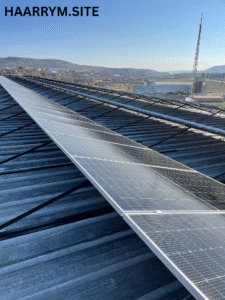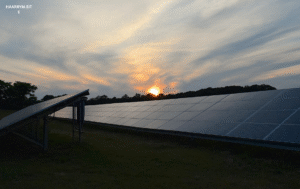Exploring Solar Power Beyond Daylight Hours
Solar energy is transforming our houses and companies’ power source. It’s renewable, neat, and growingly reasonably priced. “How do solar panels work at night?” is one of the most often asked topics, nonetheless, when one considers solar panels. Solar panels ultimately depend on sunlight to provide power; so, what happens when the sun sets?
This all-inclusive tutorial will go over what really occurs to your solar energy system after dark, how energy use is controlled at night, and what fixes guarantee ongoing electricity. Whether you live in a house, own a company, or simply have questions about renewable energy, this guide simplifies all of it in an understandable, search engine optimized manner.
Understanding How Solar Panels Work During the Day
Let’s quickly review how solar panels operate throughout the day before we go into nighttime capability.
Through solar cells, solar panels—also sometimes referred to as photovoltaic (PV) panels—absorb sunlight. Usually silicon, these cells include semiconductor materials. The photovoltaic effect is the result when sunlight stimulates electrons in the cells producing an electric current.
An inverter subsequently turns this direct current (DC) power into alternating current (AC), which qualifies for usage in your house or company.
Key components of a solar power system:
-
Solar Panels – Capture sunlight and convert it into electricity.
-
Inverter – Converts DC to AC power.
-
Battery Storage (Optional) – Stores excess energy for later use.
-
Grid Connection (Optional) – Allows excess energy to be sent to the grid or pull energy when needed.
Now that we understand daytime operation, let’s answer the key question: What happens at night?
Do Solar Panels Work at Night?
The short answer is: No, solar panels do not generate electricity at night because there is no sunlight to initiate the photovoltaic effect. However, this doesn’t mean you’ll be left in the dark.
Let’s dive into how energy needs are met at night when the panels stop producing power.
3 Ways Solar Energy Works at Night
-
Net Metering – Power from the Grid
-
Solar Battery Storage – Save Energy for Later
-
Hybrid Solar Systems – The Best of Both Worlds
1. Net Metering: Pulling Power from the Grid
Net metering is among the most often used nighttime solar energy options. It operates as follows:
Your solar panels often generate more power than you need throughout the day. The electric grid absorbs this extra energy. Your electricity provider returns credits for the excess.
Your solar panels won’t be producing at night; you may get power from the grid. The credits you already earned balance the energy you use. Your utility supplier essentially operates a give-and-trade system.
Benefits of Net Metering:
-
Reduces your monthly electricity bills.
-
Acts as virtual storage — no need for batteries.
-
Simple and efficient system for continuous power.
However, not all regions offer net metering, and policies may vary. Always check your local regulations.
2. Solar Battery Storage: Save the Sunlight
If you want to be energy independent or live in an area with no net metering, a solar battery storage system is the solution.
During the day, your panels produce electricity. Once your immediate needs are met, the excess electricity is stored in solar batteries. At night, when the sun goes down, your system draws power from the batteries.
Popular Battery Storage Options:
-
Tesla Powerwall
-
LG Chem RESU
-
Enphase Encharge
Benefits of Solar Battery Storage:
-
Keeps your lights on during blackouts.
-
Saves money on peak-time electricity rates.
-
Supports off-grid living.
Drawbacks:
-
Higher upfront cost.
-
Limited storage capacity depending on system size.
Still, battery technology is improving rapidly, becoming more efficient and affordable.
3. Hybrid Solar Systems: Combining Grid + Battery
Hybrid systems combine the best of both worlds — grid connectivity and battery backup. You can store excess power and still be connected to the grid for added reliability.
How Hybrid Systems Work:
-
Daytime: Solar panels power your home and charge the battery.
-
Evening: The system uses stored battery power.
-
If battery runs out: The grid supplies additional power.
This setup offers flexibility, energy security, and cost savings.
Do Solar Panels Work in Moonlight or Artificial Light?
One interesting inquiry that arises is: “Do solar panels work in moonlight or from street lights?”
Technically, yes—but only in very minute quantities. About 400,000 times weaker than direct sunshine, moonlight is just reflected sunlight. Artificial lights also lack the proper spectrum or intensity.
Simply said: moonlight won’t be running your house.
What Happens to Solar Panels at Night?
Even though your panels stop producing electricity, they’re still part of your energy system. At night, their function pauses, and your system switches to an alternative power source — either battery storage or the grid.
If your solar sys
Tips to Maximiztem includes a smart inverter, this transition is seamless. You won’t notice when your home switches from solar to stored or grid power.e Solar Energy for Night Use
Want to make the most of your solar investment? Here are tips to help you optimize your system for nighttime power:
1. Install Solar Batteries
Even one battery can reduce your nighttime reliance on the grid.
2. Monitor Your Energy Usage
Use apps or energy monitors to track when and how you consume power.
3. Time Your Appliances
Run high-energy appliances like dishwashers or laundry machines during peak sunlight hours.
4. Choose Energy-Efficient Appliances
LED bulbs, ENERGY STAR® appliances, and smart thermostats can reduce your overall consumption.
Benefits of Nighttime Solar Energy Solutions
-
Lower Energy Bills: Reduce or eliminate your dependence on the grid.
-
Energy Security: Stay powered even during blackouts or outages.
-
Environmental Impact: Use more of your own clean energy, less fossil fuel-based grid power.
-
Increased Property Value: Homes with energy storage systems are more attractive to buyers.
Common Misconceptions About Solar at Night
Let’s bust a few myths:
Myth 1: Solar Panels Store Energy
Wrong. Solar panels generate electricity but do not store it. Storage requires a separate battery system.
Myth 2: You Can Use Moonlight
Not effectively. While technically true, the output is negligible — not enough to power even a lightbulb.
Myth 3: You’ll Be Without Power at Night
Not true — grid-tied and hybrid systems ensure a continuous power supply 24/7.
Future Innovations: Can Solar Work at Night?
New kinds of solar panels being development by researchers could one day be operational at night. Though still in their early years, technologies such infrared solar panels and thermoradiative cells offer promise.
Right present, the most sensible approach to run your house after dark is storage and grid solutions.
Should You Get Batteries with Your Solar Panels?
It depends on your needs and budget.
When to Consider Batteries:
-
You experience frequent power outages.
-
Your area lacks net metering.
-
You want full energy independence.
-
You live off-grid.
When You Might Not Need Batteries:
-
Your utility offers favorable net metering.
-
You’re looking to minimize upfront cost.
-
You primarily want daytime energy savings.
Consult with a licensed solar installer to evaluate your specific needs.

Final Thoughts: The Sun Sets, But the Power Stays On
Although solar panels don’t provide energy at night, current technologies guarantee your house will still run. Now a 24/7 solution with choices including net metering, battery storage, and hybrid systems is solar energy.
Even when the sun sets, there is a solar arrangement to fit your goals whether they be energy independence, decreased expenses, or lessening of your carbon imprint.
When someone asks, “How do solar panels work at night,” next time You will know the response: Your system does; others do not.
FAQs
Q1: Do solar panels work during cloudy or rainy days?
Yes, but they produce less electricity. Cloudy weather reduces sunlight, but panels still work at reduced efficiency.
Q2: Can solar panels charge during the night with artificial light?
Technically yes, but the amount of electricity produced is insignificant.
Q3: How long can solar batteries last during the night?
It depends on battery size and your energy usage. Many systems are designed to last through the night.
Q4: Can I live completely off-grid with solar?
Yes, but you’ll need a larger solar system and adequate battery storage to support 24/7 energy needs.
